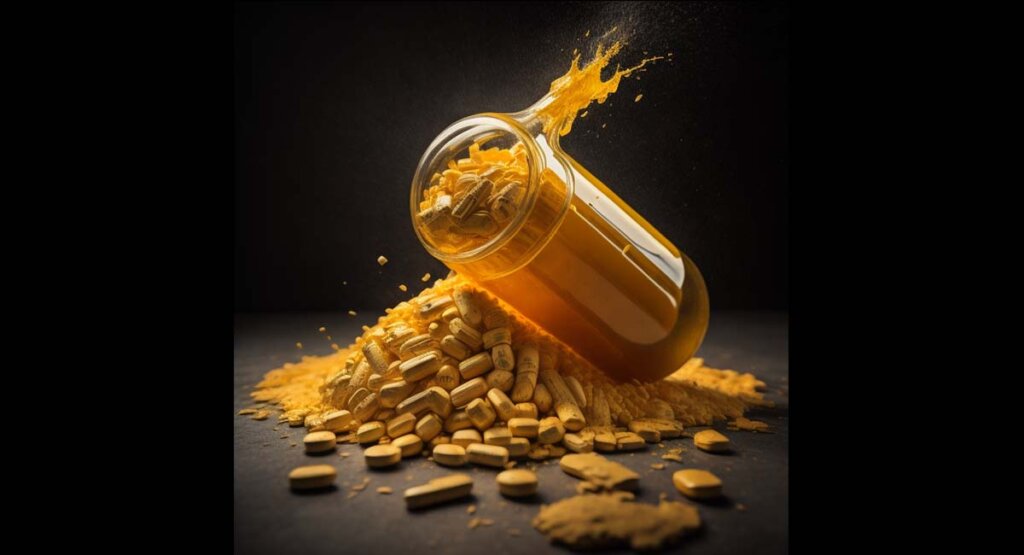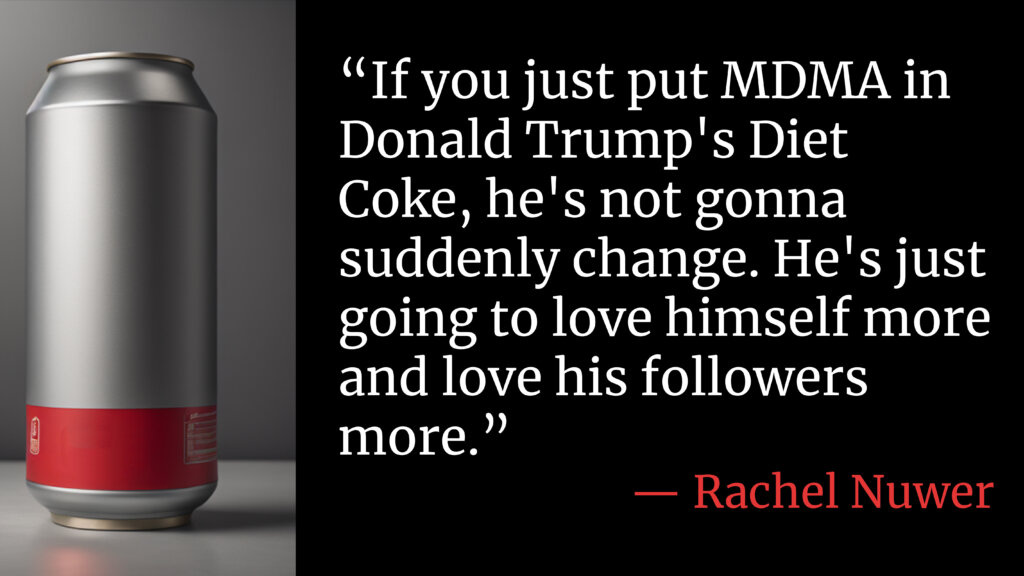Can we cure antisemitism with molly?
An MDMA study hints at psychedelics’ impact on hate

AI-generated illustration of a neo-Nazi renouncing his ways after taking MDMA Graphic by Laura E. Adkins
If you learned that a single pill had led a neo-Nazi to renounce his hateful beliefs, would you:
- Demand more research to find out if the pill really works
- Ignore existing evidence and continue to outlaw the pill?
If you picked the second option, congratulations: You’ve just described the folly of American drug policy for the past 40 years.
We’ve long known that MDMA, more popularly known as molly or ecstasy, is an effective treatment for Post Traumatic Stress Disorder. Israel has used it for this purpose since 2019.
But there is also some preliminary evidence that the drug can turn haters into lovers, making it a powerful potential tool for deradicalization.
The FDA is expected to approve MDMA and psilocybin, also known as psychedelic mushrooms, for PTSD therapy within the next two years. But further progress on more experimental fronts has long been delayed by regulatory hurdles.
At a time when hate, extremism and intolerance threaten to tear America apart, it is mind-boggling that we are not pushing to better understand how MDMA and other psychedelics can bring people together, or aid efforts to deradicalize people lost to hate.
How MDMA changed one neo-Nazi
The most promising evidence of MDMA’s effects on hate was discovered by accident. During the conclusion of a 2020 University of Chicago double blind study on the effect of MDMA on social touch, one participant known as “Brendan” revealed to researchers that he led the Midwest branch of Identity Evropa, a white nationalist group that played a key role in the 2017 “Unite the Right!” rally — and that taking MDMA had led him to a life-changing revelation.
“Love is the most important thing,” he told a stunned researcher, who followed up. “Nothing matters without love.”
Brendan’s story shocked researchers, and for good reason.
“To think that a drug could change somebody’s beliefs and thoughts without any expectations,” said Dr. Harriet de Wit, the study director, “it’s mind-boggling.”
Rachel Nuwer, who spoke with “Brendan” for her just-released book, I Feel Love: MDMA and the Search for Connection in a Fractured World, told me in a phone interview that his story “does raise the possibility that this could be a ripe field of investigation. Can we use MDMA or other psychedelics as tools to de-radicalize people with extremist views, at least people who are somewhat open to it?”
The strange and very Jewish story of the ‘love drug’
First synthesized by a Merck pharmaceutical chemist in 1911, MDMA sat unexplored for decades until Alexander Shulgin, a California pharmacologist whose family fled persecution in Czarist Russia, began experimenting with it as a psychedelic substance.
“This substance stimulated but was not a stimulant,” he wrote, “it disinhibited without being an intoxicant; it helped to express feelings and emotions more freely, but without impairing self-control.”

Shulgin, whom Jewish Currents called “the zeyde [grandfather] of psychedelics” and his fellow researchers, “had no idea how this new medicine produced such stunning results,” writes Nuwer. “All they knew was that it seemed to catalyze mental breakthroughs that normally would take months, years, or even a lifetime of traditional therapy to achieve.”
At the same time, MDMA was spreading internationally as a party drug— Israelis were among the largest underground distributors of Ecstasy in the world, according to Nuwer. That raised alarms among the generals in America’s disastrous “War on Drugs,” a process that Nuwer’s book reveals in all its tortured, bureaucratic folly.
The upshot? Since 1985, MDMA has been banned as a Schedule I drug in the United States.
“All the federal funding was going into finding out the harms of drugs, proving that these things are going to melt your brain or whatever,” Nuwer told me during a phone interview.
Enter Rick Doblin, the activist founder of the Multidisciplinary Association for Psychedelic Studies. After being introduced to MDMA by one of its pioneering users, Dr. Stanslav Grof, Doblin, then a psychology undergraduate, began a multi-decade pathway toward FDA approval of MDMA research and use.
Nuwer said Doblin, born into a Conservative Jewish family in Chicago, learned “oppressive rules are made to be broken” while delivering prayer books to Soviet Jews in the 1970s.
“What I learned from my parents is that there are big, big systems going on in the world, but you can make tiny individual differences,” said Doblin. “You can’t open up Judaism in Russia, but you can bring two prayer books.”
That MDMA’s history is so tied to Jews — Shulgin, Zeff, Grof, Doblin, and numerous others — makes sense when you understand the power of the drug, said Natalie Lyla Ginsberg, MAPS global impact officer.
“We have a lot of intergenerational trauma,” she told me, “and a lot of space to ask questions.”
Palestinians, Israelis and the Limits of Ecstasy
Ginsberg, a Yale graduate whose time as a social worker exposed her to the injustices of the drug war, runs the annual Jewish Psychedelic Summit, which connects doctors, rabbis, therapists and others in an online “global conversation” about the connections between psychedelics and Judaism. She is working with researchers at Hebrew University to develop metrics for exploring MDMA’s use in conflict resolution between Palestinians and Israelis. But she and Nuwer say preliminary results point to a big caveat in psychedelic research in general, and MDMA in particular: it’s not magic.
Intention, said Nuwer, is everything. Couples need to go into MDMA therapy looking to heal their relationship. Addicts need to want to kick their habits — in which case MDMA has proven to be far more effective than traditional therapies. Cult members need to be ready to leave their cults.
And former white supremacists like Brendan need to be open to change.
Before taking part in the study, Brendan had already been outed as an extremist and had been fired from his job because of it. His family was no longer talking to him. He wanted a new life.
“It’s really about what you bring to the experience,” Nuwer told me. “MDMA can perhaps nudge you in that direction and open your mind, if you’re already a little bit open to it. But, you know, if you just put MDMA in Donald Trump’s Diet Coke, he’s not gonna suddenly change. He’s just going to love himself more and love his followers more.”
The truth is, there are still many unknowns about how MDMA works and under what conditions it can, in Nuwer’s fine prose, “grease the wheels of connection with the self, with others, and with all life on the planet.”

A rare, bipartisan way forward
That’s why I keep coming back to the communal self-interest in supporting more and better research.
There may be no greater testament to the unique power of MDMA than the fact that it has inspired a rare bipartisan bill in Congress. The bill, sponsored by Rep. Alexandria Ocasio-Cortez, the New York Democrat, and Rep. Dan Crenshaw, the Texas Republican, would remove federal barriers that make it difficult for scientists to study the drug. It would be fitting if Jewish groups, following the legacy of MDMA’s Jewish pioneers, threw their support behind the bill.
The drug’s Jewish pioneers were on to something: MDMA therapy has already demonstrated its ability to break down the hate, trauma and conflict that can not just destroy individuals, but entire societies. There is promising research using MDMA to rescue couples on the brink of divorce and as treatment for antisocial behavior. Much additional research is needed, and we can help clear the way.
And what about Brendan, the former white supremacist who found some salvation in MDMA? Nuwer, who is still in touch with him, said he has refused media interviews because he wants to move on in his life. He told her he wants to continue taking MDMA as therapy, but not under the current law.
“He’s kind of waiting for it to become legalized,” she said.
Hopefully, he won’t have to wait much longer.
Correction: The original version of this article misspelled Brendan’s name.

















